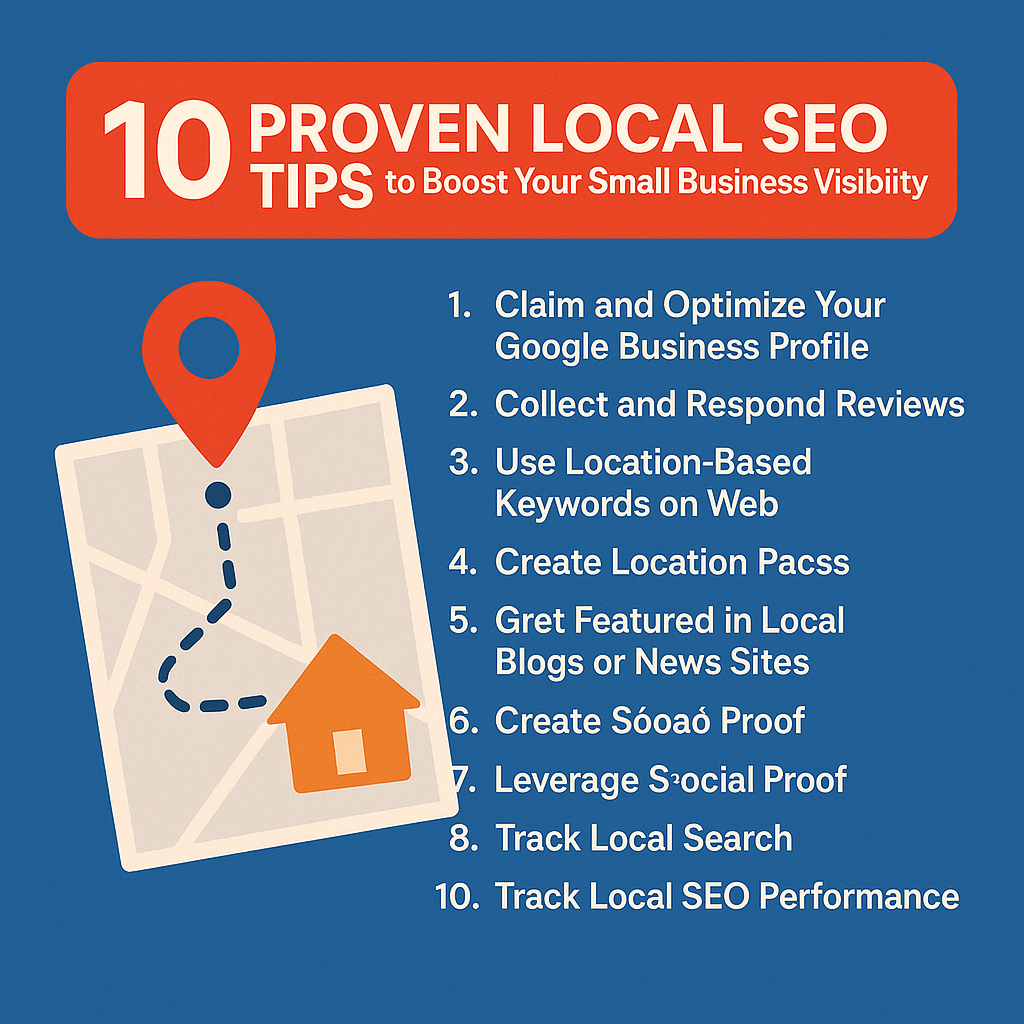10 Proven Local SEO Tips to Boost Your Small Business Visibility
In today’s digital landscape, local visibility is essential for small businesses looking to attract nearby customers. When potential clients search for products or services in your area, appearing at the top of their search results can make the difference between gaining a new customer or losing them to a competitor.
Local SEO (Search Engine Optimization) focuses on optimizing your online presence to attract more business from relevant local searches. These searches take place on Google and other search engines, with users looking for businesses, products, or services in their vicinity.
Let’s explore ten local SEO tips that can significantly boost your small business’s local visibility and help you connect with more customers in your community.
Click Here to Transform Your Local Visibility
1. Optimize Your Google Business Profile
Your Google Business Profile (formerly Google My Business) serves as your business’s digital storefront on Google Search and Maps. A properly optimized profile significantly impacts your local search visibility.
Key optimization steps:
- Claim and verify your listing – Ensure you have full control of your business information
- Complete all information fields – Include business category, services, business hours, phone number, and website URL
- Add high-quality photos – Upload professional images of your business, products, team, and work examples
- Keep information accurate and updated – Regularly check that your business details are current
- Add special attributes – Highlight features like “wheelchair accessible,” “outdoor seating,” or “free Wi-Fi”
- Create Google Posts – Share updates, events, offers, and announcements directly on your profile
Businesses with complete and active Google Business Profiles are more likely to appear in the coveted “Local Pack” (the map and three business listings that appear at the top of local search results).
2. Use Local Keywords
Strategic keyword use helps search engines understand your business’s relevance to local searches.
Effective keyword implementation:
- Research local keywords – Identify terms people use when searching for your products or services in your area
- Include location-based terms – Add your city, neighborhood, and region to your keywords
- Use keywords naturally – Incorporate keywords in page titles, meta descriptions, headers, and content
- Create location-specific service pages – Develop pages for each service area with relevant local keywords
- Avoid keyword stuffing – Focus on readability and natural language over cramming in keywords
Use tools like Google Keyword Planner, Ubersuggest, or Semrush to identify valuable local keywords with good search volume and manageable competition.
3. Build Local Citations
Citations are online mentions of your business name, address, and phone number (NAP). Consistent citations across the web strengthen your local SEO foundation.
Citation building strategies:
- Ensure NAP consistency – Use identical business information across all platforms
- List your business on key directories – Include Yelp, Yellow Pages, Better Business Bureau, and industry-specific directories
- Create social media profiles – Maintain active profiles on Facebook, Instagram, LinkedIn, and Twitter
- Get listed in local business associations – Join your Chamber of Commerce and industry organizations
- Check and fix incorrect citations – Use tools like Moz Local or BrightLocal to find and correct inconsistencies
Research shows that businesses with accurate citations on relevant platforms rank higher in local search results than those with inconsistent or missing information.
4. Optimize for Mobile Users
With most local searches occurring on mobile devices, mobile optimization is essential for local SEO success.
Mobile optimization tactics:
- Implement responsive design – Ensure your website looks great on all screen sizes
- Improve page speed – Compress images, minimize code, and leverage browser caching
- Simplify navigation – Make menus easy to use with fingers on small screens
- Use legible fonts – Ensure text is readable without zooming
- Optimize for local voice search – Include conversational phrases people might speak rather than type
- Add click-to-call buttons – Make it easy for mobile users to contact you with one tap
Google’s mobile-first indexing means the mobile version of your website primarily determines your search rankings. Poor mobile experience can significantly harm your local visibility.
5. Get More Online Reviews
Reviews serve as powerful social proof and are a critical local ranking factor.
Review generation best practices:
- Ask satisfied customers for reviews – Create a systematic approach for requesting feedback
- Make reviewing easy – Send direct links to your review profiles via email or text
- Respond professionally to all reviews – Thank positive reviewers and address negative feedback constructively
- Never buy fake reviews – Focus on genuine customer experiences
- Showcase reviews on your website – Feature testimonials prominently to build trust
- Monitor review platforms – Stay alert to new reviews across Google, Yelp, Facebook, and industry sites
Research indicates that businesses with recent, positive reviews are more likely to rank well in local searches and convert prospects into customers.
6. Leverage Local Link Building
Backlinks from reputable local websites signal to search engines that your business is established and trustworthy in your community.
Local link building opportunities:
- Partner with complementary businesses – Create mutually beneficial relationships with non-competing local businesses
- Sponsor local events – Support community activities to earn backlinks from event pages
- Participate in community initiatives – Get involved with local charities and organizations
- Pursue local media coverage – Connect with journalists for feature stories about your business
- Join local business associations – Get listed in member directories
- Create linkable local content – Develop resources that local websites would want to reference
Quality matters more than quantity—a few links from trusted local sources provide more SEO value than many links from irrelevant or low-quality sites.
7. Utilize Social Media for Local Engagement
While not a direct ranking factor, social media enhances your overall online presence and drives local awareness.
Social media localization tactics:
- Share local news and events – Demonstrate community involvement
- Use location tags and local hashtags – Increase visibility to local audiences
- Engage with local businesses and influencers – Build relationships through comments and shares
- Post about community involvement – Highlight your business’s participation in local activities
- Share customer success stories – Feature the experiences of local customers
- Run geo-targeted social ads – Reach potential customers in specific geographic areas
Consistent, engaging social media activity increases brand awareness, drives website traffic, and creates opportunities for customer engagement—all factors that indirectly support your local SEO efforts.
8. Create Location-Specific Content
Content that addresses local interests and needs demonstrates your relevance to the community.
Localized content ideas:
- City guides – Develop resources related to your industry for your specific location
- Local event coverage – Share insights about industry events in your area
- Customer spotlights – Feature local customers and their experiences
- Local FAQ pages – Address common questions specific to your location
- “Best of” lists – Create roundups of local resources related to your industry
- Neighborhood pages – Develop content for specific neighborhoods you serve
This content naturally incorporates local keywords and provides valuable information that attracts both search engines and potential customers.
9. Implement Structured Data Markup
Schema markup helps search engines understand your content better, potentially enhancing how your business appears in search results.
Structured data implementation tips:
- Add LocalBusiness schema – Mark up your NAP information, hours, and services
- Implement Review schema – Highlight customer ratings and testimonials
- Use Event schema – Promote upcoming events at your business
- Add Product schema – Showcase your offerings with rich results
- Utilize FAQ schema – Display frequently asked questions directly in search results
Properly implemented structured data can help your business earn rich snippets in search results, increasing your visibility and click-through rates.
10. Focus on Localized Paid Advertising
Strategic paid advertising complements your organic local SEO efforts and delivers immediate visibility.
Effective local advertising approaches:
- Google Local Service Ads – Appear at the top of search results with a Google Guarantee badge
- Google Ads with location targeting – Run search campaigns focused on your service areas
- Local inventory ads – Promote products available at your physical location
- Facebook ads with geo-targeting – Reach specific local demographics
- Yelp advertising – Appear prominently in relevant Yelp searches
- Nextdoor advertising – Connect with nearby neighborhoods
The key to successful local advertising is precise geographic targeting combined with compelling offers and clear calls to action.
Ready to Dominate Local Search? Let’s Make It Happen!
Implementing these ten local SEO tactics will significantly improve your small business’s visibility, but we understand it can be overwhelming to tackle alone. You’re an expert in your business—let us be the experts in getting you found online.
Thomas Town Digital specializes in helping local service businesses like yours climb to the top of local search results. Our proven strategies have helped businesses across multiple industries increase their visibility, attract more qualified leads, and grow their customer base.
Why struggle with the complexities of local SEO when you could have a dedicated team of experts working for you?
Take the First Step Toward Local Search Dominance—Contact Us Today!
Our team will provide a free, no-obligation assessment of your current local SEO status and identify your biggest opportunities for growth. Don’t let another day pass while competitors capture your potential customers online.


[…] visitors to your website aren’t ready to contact you immediately. Remarketing keeps your business visible as they continue […]
[…] these proven strategies and avoiding common pitfalls, your HVAC, roofing, or contracting business can achieve sustainable visibility in local search results, translating directly to more phone calls, more service appointments, and more […]